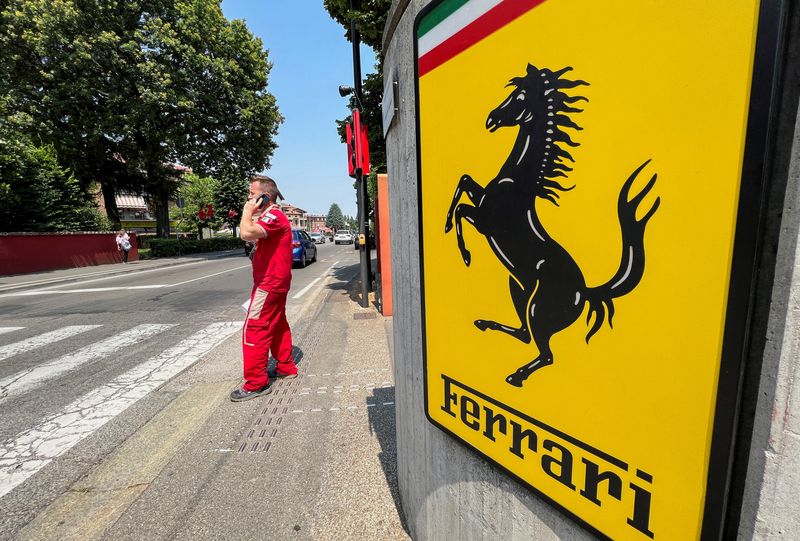Bullish indicating open at $55-$60, IPO prices at $37
On Tuesday, UBS analyst Susy Tibaldi revised the price target for Ferrari (BIT:RACE) stock, listed on the New York Stock Exchange (NYSE: RACE), reducing it to $520 from the previous $584 while sustaining a Buy rating on the shares. Tibaldi anticipates that the upcoming first-quarter results, scheduled for May 6, will once again affirm the robustness of Ferrari’s brand and business model, as demand for high-end vehicles continues to outstrip supply even amid broader macroeconomic conditions. InvestingPro analysis indicates the stock is currently trading above its Fair Value, with analyst targets ranging from $405 to $609.
In the previous week, Ferrari announced a price increase in the United States, which could go up to 10% on select models. This move is in response to the 25% auto tariffs and is expected to have a minimal effect on the company’s profit and loss statement, with a potential risk of a 50 basis points impact on margins. According to Tibaldi, this demonstrates Ferrari’s exceptional ability to price its products, addressing a significant concern that investors had about the stock. The company’s pricing power is reflected in its impressive 50.13% gross profit margin and 11.83% revenue growth over the last twelve months. InvestingPro subscribers can access 16 additional key insights about Ferrari’s financial strength and market position.
The analyst predicts a strong start to the year, with the first quarter likely being the most robust, unaffected by tariffs, and featuring the highest number of Daytona models for the year. Tibaldi’s outlook is set against a backdrop of a more challenging environment for the luxury sector. Despite these conditions, UBS continues to favor Ferrari for its consistent performance and delivery, which is underpinned by the company’s emphasis on scarcity and robust customer relationships. This is supported by Ferrari’s strong financial health score of "GOOD" from InvestingPro, along with its healthy current ratio of 1.76 and solid return on equity of 46%.
UBS has adjusted its earnings per share (EPS) estimates for Ferrari for the years 2025, 2026, and 2027 downward by 3%, citing foreign exchange fluctuations and the impact of tariffs as the driving factors for this revision. Despite the cut in the price target and EPS estimates, the firm’s Buy rating remains unchanged, reflecting confidence in Ferrari’s market position and business strategy. The company’s current P/E ratio stands at 46.85, with analysts forecasting EPS of $9.86 for fiscal year 2025. For detailed valuation metrics and comprehensive analysis, investors can access Ferrari’s full Pro Research Report, available exclusively on InvestingPro.
In other recent news, Ferrari has confirmed its financial targets for 2025 despite the introduction of new U.S. tariffs on auto imports. The company plans to partially adjust prices for certain models to accommodate the tariffs, with increases capped at 10% for models imported after April 2, 2025. Orders for the 296, SF90, and Roma models will not see price changes, regardless of import dates. Analysts at Kepler Cheuvreux have upgraded Ferrari’s stock rating from Hold to Buy, maintaining a price target of EUR 470.00, citing the recent share price drop as a strategic opportunity for investors. Barclays (LON:BARC) also upgraded Ferrari’s stock to Overweight, setting a new price target of EUR 485.00, following the company’s confirmation of its financial goals and commercial policy update.
Ferrari’s financial goals for 2025 include an EBIT of at least €2.03 billion, an adjusted EPS of at least €8.60, and a free cash flow of more than €1.2 billion. However, the company acknowledges a potential risk of a slight reduction in EBIT/EBITDA percentage margins. Bernstein has reiterated an Outperform rating for Ferrari, with a price target of $575.00, despite the challenges posed by the new tariffs. The firm believes that Ferrari’s affluent customer base is well-positioned to handle potential price increases, suggesting that demand for the brand’s luxury vehicles will remain strong. These developments reflect Ferrari’s strategic adjustments and resilience in the face of evolving trade policies and market conditions.
This article was generated with the support of AI and reviewed by an editor. For more information see our T&C.
